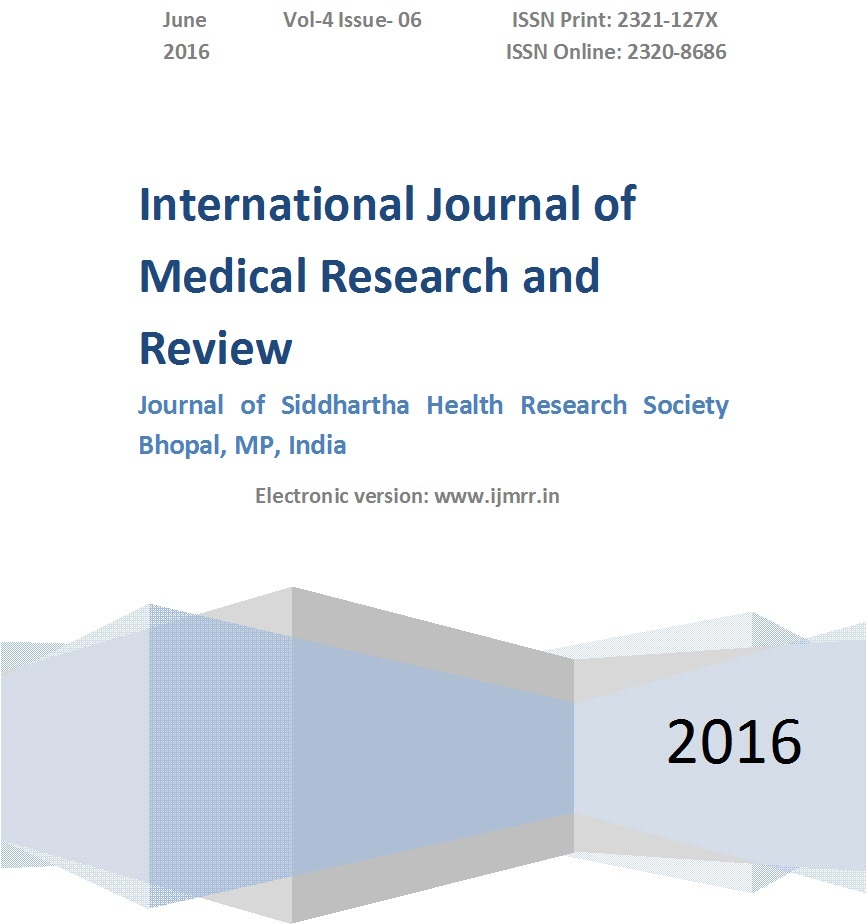Rupture of pregnant uterus: incidence, risk factors, maternal and fetal outcome
Abstract
Objective: To determine the incidence, risk factors, complications, management modalities and maternal and perinatal outcome of rupture uterus in pregnancy.
Methods: This retrospective study was carried out at a teaching institute, for a period of 10 years from January 2006 to December 2015. Clinical records of cases of uterine rupture were reviewed and information on demographic characteristics, clinical presentation, intraoperative findings, surgical intervention and maternal and perinatal outcome was collected.
Result: Out of 63237 deliveries, 116 cases of rupture uterus were reported with an incidence of rupture uterus 1 in 545. Majority 52 (44.83%) of cases were in age group 26-30 years. Only 1 was primigravida, 16 (13.79%) were of parity > 5 and remaining of parity 1- 4. Majority were unbooked cases. 93 (80.17%) were referred from other health centers and only 23 (19.83%) cases were admitted directly. Uterine scar (58.62%) and obstructed labor (24.13%) were the common risk factors. Anterior uterine wall of lower uterine segment was the most common site of rupture. Repair of rupture site with or without bilateral tubal ligation was done in 60 (51.72%) cases, while subtotal hysterectomy was performed in 46 (39.65%) cases. Hypovolumic shock was the major cause of maternal death.
Conclusion: Promotion of skilled attendance at birth, identification of high risk women and timely referral, use of oxytocic drugs cautiously , correct use of partograph, preventing unnecessary caesarean sections and education of people about supervised pregnancy and delivery are essential in reducing the occurrences of uterine rupture.
Downloads
References
Al-Zirqi I, Stray-Pedersen B, Forsén L, Vangen S. Uterine rupture after previous caesarean section. BJOG. 2010 Jun;117(7):809-20. doi: https://doi.org/10.1111/j.1471-0528.2010.02533.x. Epub 2010 Mar 24.
Hofmeyr GJ, Say L, Gülmezoglu AM. WHO systematic review of maternal mortality and morbidity: the prevalence of uterine rupture. BJOG. 2005 Sep;112(9):1221-8.doi: https://doi.org/10.1111/j.1471-0528.2005.00725.x.
Baskett TF, Caldier AA, Arulkumaran S. Munro Kerr’s operative obstetrics. Eleventh edition. China: Elseiver; 2007.175-180.
Rathod S, Samal SK, Swain S. A Three Year Clinicopathological Study of Cases of Rupture Uterus. J Clin Diagn Res. 2015 Nov;9(11):QC04-6. doi: https://dx.doi.org/10.7860%2FJCDR%2F2015%2F14554.6783. Epub 2015 Nov 1.
K Sunita, I Indra, P Suguna. Clinical study of rupture uterus. IOSR-JDMS 2015 March;14 (3): 39-45.
Sahu L. A 10 year analysis of rupture uterus at a teaching institution. J Obstet Gynecol India 2006; 56 (6): 502-506.http://medind.nic.in/jaq/t06/i6/jaqt06i6p502.pdf.
Fofie C, Baffoe P. A two-year review of uterine rupture in a regional hospital. Ghana Med J. 2010 Sep;44(3):98-102.doi: https://dx.doi.org/10.4314%2Fgmj.v44i3.68892.
Ibrahim SM, Umar NI, Garba NA, Bukar M, Ibrahim HA. A reappraisal of ruptured uterus in a suburban referral hospital, North-Eastern Nigeria. International Journal of Medical and Applied Sciences 2014; 3(1): 299-308.
Revicky V, Muralidhar A, Mukhopadhyay S, Mahmood T. A Case Series of Uterine Rupture: Lessons to be Learned for Future Clinical Practice. J Obstet Gynaecol India. 2012 Dec;62(6):665-73. doi: https://doi.org/10.1007/s13224-012-0328-4. Epub 2013 Jan 16.
Miller DA, Diaz FG, Paul RH. Vaginal birth after cesarean: a 10-year experience. Obstet Gynecol. 1994 Aug; 84(2):255-8.
Cahill AG, Tuuli M, Odibo AO, Stamilio DM, Macones GA. Vaginal birth after caesarean for women with three or more prior caesareans: assessing safety and success. BJOG. 2010 Mar;117(4):422-7. doi: https://doi.org/10.1111/j.1471-0528.2010.02498.x. Epub 2010 Jan 28.
Shinde G, Pawar A, Jaisal P, Jadhav B. Maternal and perinatal outcome of rupture uterus at tertiary care centre. Bombay Hospital Journal 2011; 53 (3): 622-625.



 OAI - Open Archives Initiative
OAI - Open Archives Initiative


